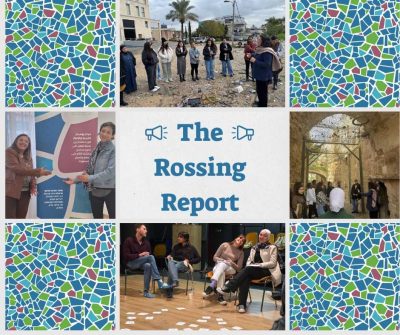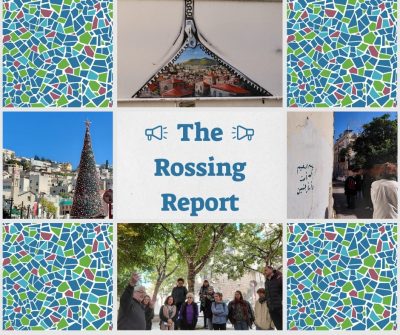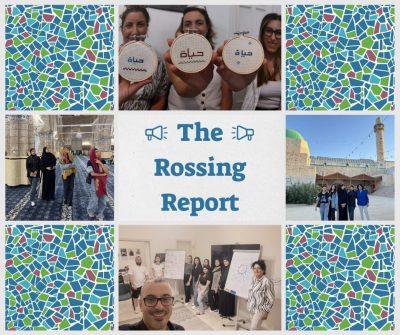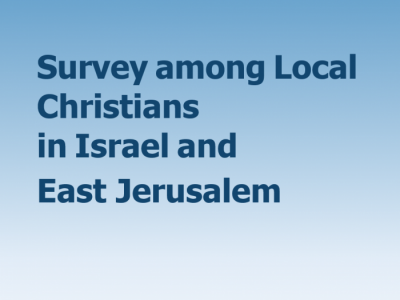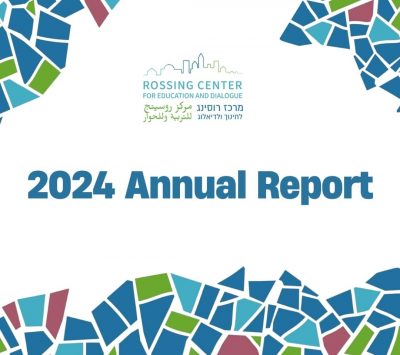What is the background to the crisis in the relations between Israel and the heads of the Churches in Jerusalem?
Dr. Amnon Ramon, Jerusalem Institute for Policy Research[1]
On Sunday, 25 February 2018, a historic and unprecedented incident occurred in the Old City of Jerusalem.[2] Representatives of three of the most important Churches in the Holy Land (the Greek-Orthodox Patriarch, the Armenian Patriarch, and the Custos of the Holy Land for the Catholic Church) announced the closure of the Church of the Holy Sepulcher, the most important site held sacred by almost all branches of Christianity. Thousands of pilgrims, tourists, and local visitors found the church closed and read in amazement the banner hung on an adjacent building declaring “Stop the Persecution of Churches,” under the slogan “Enough is Enough.”
The heads of the Churches in Jerusalem published a joint declaration comparing Israel’s actions to “laws of a similar nature which were enacted against the Jews during dark periods in Europe.”[3] The Churches protested that “this systematic and unprecedented attack against Christians in the Holy Land severely violates the most basic, ab antiquo and sovereign rights, trampling on the delicate fabric of relations between the Christian community and the authorities for decades”. A press conference held in front of the locked church attracted enormous attention from the international media, though reporting in the Israeli media was muted.
This dramatic and unprecedented action by the heads of the Churches in Jerusalem was intended, as they declared, as a reaction to two steps taken by different branches of the Israeli governmental system without coordination. The heads of the Churches, however, viewed these actions as part of an orchestrated campaign.
The first step was the decision by Jerusalem Mayor Nir Barkat to freeze the bank accounts of the Churches in Jerusalem due to their debts for payment of municipal tax on their properties in the city. Barkat even attempted to confiscate property at one of the Catholic monasteries in the Old City.
This step is the latest link in the chain of efforts by the Israeli authorities to address a complex issue that has a long and convoluted history, dating back to the second half of the nineteenth century.[4]
The current reality is that the Churches do not pay municipal taxes, despite repeated payment demands and warnings from the Jerusalem Municipality. The Church leaders claim that they never paid municipal or governmental taxes during the period of Ottoman, British, Jordanian, and Israeli rule, since they are religious bodies that maintain educational, welfare, and charitable institutions that serve the local population; and that they effectively fill the role of the State in the areas, so that – according to their perspective – the State should support them rather than imposing taxes on them. The Churches view the exemption from payment of municipal and other taxes as part of their historical rights as formalized in the status quo arrangements introduced in the Ottoman firmans of 1852 and 1853, which received international approval at the Congress of Paris (1856) and the Congress of Berlin (1878), and in the Agreements of Mytilene (1901) and Constantinople (1913) between France and the Ottoman Empire. They claim that these exemptions were also enshrined in the legislation of the British Mandate (the Mandatory Municipalities Ordinance of 1934, the Municipal and Government Taxes Ordinance of 1938, and other acts of legislation).

Pilgrims observing the Greek Orthodox fire ceremony from the window of the Church of the Holy Sepulcher, Jerusalem
Photo by: Moshe Milner, Government press office
In this context, the heads of the Catholic institutions also mention the Fisher-Chauvel Exchange of Letters of 1949, between Morris Fisher, the Israeli envoy to Paris, and Jean Chauvel, Secretary-General of the French Foreign Ministry, as proof of Israel’s agreement to grant full exemption from municipal and governmental taxes to French Catholic institutions in return for France’s recognition of Israel (a similar arrangement was also found for the Catholic institutions under Italian patronage). The Catholic representatives further mention the Fundamental Agreement between Israel and the Holy See (the Vatican) signed in December 1993, article 10 of which establishes that during the period of negotiations between the two sides regarding the Church’s assets and economic issues (including taxation), no unilateral actions will be taken that are incompatible with the parties’ commitments to negotiate in good faith and to reach an agreement within a two-year period.[5] However, the negotiations on these subjects have in fact dragged on for 24 years. The subject of taxes in Jerusalem is particularly complicated, since the payment of municipal tax to the Jerusalem Municipality could be interpreted as recognition by the Churches of Israeli sovereignty over East Jerusalem – a position that is unacceptable to the international community and to most of the countries and international bodies that support the Churches and Christian bodies active in Jerusalem.
From the perspective of the Israeli authorities (at the local and national level), the issue of payment of municipal tax by the Churches forms part of the wider problem of the exemption granted to religious institutions, which reduces the income received by local authorities – particularly in Jerusalem, where the Churches hold extensive areas of land and considerable property. According to a study by Israel Kimchi of the Jerusalem Institute for Policy Studies, the Churches in Jerusalem hold some 5,000 dunams (approx. 1,235 acres) of land in important and central areas of the city, such as the Old City, the Historic Basin, the Mount of Olives, Liberty Bell Park and Bloomfield Garden, Keren Hayesod Street and the surrounding area, the Talbiyeh neighborhood, the Valley of the Cross and the surrounding area, the public park around San Simon Monastery, the area around Mar Elias Monastery close to the Har Homa neighborhood, and elsewhere. Former mayor of Jerusalem Teddy Kollek used to quip of the various religious bodies that “they pray but don’t pay.”

Easter at the Church of the Holy Sepulcher. Photo by Amnon Ramon
Since the establishment of the State of Israel, the authorities at various levels have constantly prevaricated on this sensitive issue, which also has ramifications for Jewish and Muslim religious institutions. One proposal raised to solve the issue is to introduce a distinction between the Churches’ activities in the religious and charitable fields, which are exempt from tax, and other fields such as hostels, hotels, stores, and the leasing of apartments that yield income liable to taxation. However, such a distinction is not always simply to apply. Moreover, the Church leaders argue that their income in these fields finance their activities in the fields of religious services, education, and welfare.
Another idea raised by way of a partial solution was to collect levies in return for specific services provided by the Municipality to the Christian religious institutions, such as garbage removal. This idea has also not been implemented to date, and most of these institutions do not pay any municipal taxes. The enactment of the Arrangements Law by the Knesset at the end of 2002 complicated the situation still further: It cancelled the exemptions to religious institutions that offer health, hospitality, and welfare services (with the exception of houses of prayer, ritual baths, and educational institutions),[6] effectively requiring the local authorities to send payment demands. Since then the payment demands sent to the Churches have piled up, creating a large and growing debt. In the case of the Catholic Church, this legislation contradicts Article 10 of the Agreement between the Holy See and the State of Israel from December 1993, as mentioned above.

Mayor Nir Barkat. Photo by Ilan Kostica
The latest significant development in this respect came at the beginning of February 2018, when the Jerusalem Municipality, under Mayor Nir Barkat, began to implement a new policy. The Municipality initiated proceedings to collect municipal tax debts totaling NIS 650 million from the Churches active in the city. According to the announcement published by the Municipality on its website on 20 February 2018, under the heading “Where has NIS 650 million belonging to the residents of Jerusalem gone?”, there are 887 properties in the city that belong to the Churches and the United Nations institutions that do not pay municipal taxes.[7] The Municipality argues that these properties are not houses of prayer exempt from taxation, but offices, schools, and buildings intended for various needs. According to the announcement, the Municipality has already frozen several bank accounts belonging to the Churches and confiscated NIS 7.2 million from the Anglican Church, NIS 2 million from the Armenian Church, NIS 11 million from the Catholic Church, and NIS 570,000 from the Greek-Orthodox Church. The Municipality’s announcement is based on the legal opinion of Prof. Gabriel Hallevy of Ono Academic College, which stated that the Churches can only enjoy exemption from payment of municipal tax if the property is used for prayer or religious studies.[8] The opinion did not address the Fundamental Agreement signed between Israel and the Holy See in December 1993, nor the negotiations on these subjects that have been pursued over the past 24 years.
In a press release, Mayor Nir Barkat emphasized that “we will no longer agree that the residents of Jerusalem finance these enormous sums.” He argued that “the State should cope with the ramifications of its decisions – either the State should indemnify us and reimburse these funds intended for the development of the city, or we should collect it as the law requires.” Barkat stressed that “we intended to take administrative and legal collection and enforcement actions, and if necessary we will not hesitate to petition the Supreme Court.”
The Municipality’s announcement and its actions to collect municipal tax provoked fierce reactions from the heads of the Churches in Jerusalem, which boycotted the traditional reception held by the mayor to mark the New Year. On 14 February 2018, the heads of the Churches in Jerusalem met and signed a joint Statement criticizing the Municipality’s actions with unprecedented severity. The Churches argued that “the [municipal] Statement is contrary to the historic position between the Churches within the Holy City of Jerusalem and the civil authorities across the centuries,” and emphasized that “the civil authorities have always recognized and respected the great contribution of the Christian Churches, which invest billions in building schools, hospitals, and homes, many for the elderly and disadvantaged […].” The Church leaders declared that “such a measure both undermines the sacred character of Jerusalem, and jeopardizes the Church’s ability to conduct its ministry in this land on behalf of its communities and the world-wide church.”[9]
The Church leaders complained of the Municipality’s unilateral actions, which struck them like a thunderstorm on a clear day. They claimed that the Mayor did not even mention the subject during his visits to Church leaders over the Christmas season. The journalist Nir Hasson quoted claims by sources close to the Churches in the city that Barkat’s true motives behind the move are connected to his plans to compete in future elections in the Likud party and to his campaign against the Finance Ministry and the Finance Minister regarding the municipal budget.[10] The Church leaders repeatedly emphasized that the State and the Municipality do not contribute to the maintenance of the holy places or to a large portion of the activities of the Christian institutions in the fields of welfare, health, and education.
The crisis between Israel and the Churches surrounding municipal tax also has an additional dimension: the affair surrounding the extension of the period of lease on lands belonging to the Greek-Orthodox Patriarchate
This affair has its beginnings in the 1950s, when the JNF-KKL, on the initiative of the State, leased extensive areas in the Talbiyeh and Nayot areas of Jerusalem. Most of the lease contracts were for a period of 100 years and will expire around 2050. After the Six Day War (1967), additional areas under the ownership of the Patriarchate were leased to Israeli public and commercial bodies. These areas are situated in and around Liberty Bell Park, the Abu Tor neighborhood, Katamon, and Givat Oranim close to San Simon Monastery. Over the years, hundreds of housing units were built on this land. Many of the purchasers of the apartments were unaware that the homes they live in (and for which they paid in full) were constructed on land owned by the Churches. Public institutions were also built on such land, including the National Labor Court in Talbiyeh, youth movement centers in the Valley of the Cross, and large public gardens such as Liberty Bell Park, Bloomfield Garden, and San Simon Park.
Around the year 2000, negotiations were held between the JNF-KKL and representatives of the Greek-Orthodox Patriarchate concerning the extension of the period of lease beyond 100 years. The State allocated a sum of $ 20 million that was due to be paid to the Patriarchate via the JNF-KKL, but the deal failed to materialize and it emerged that the affair had entailed fraud.[11]
In recent years, private promoters and companies whose identity remains unclear have managed to purchase land, or lease rights for an additional 200 years, from Christian bodies, particularly the Greek-Orthodox Patriarchate. This new reality has led to uncertainty in the real estate market in these neighborhoods of Jerusalem, and some of the apartment owners (some of whom are elderly and long-standing residents of the city) feel that they have been left alone to confront wealthy promoters. They feel that the JNF-KKL and the State, which were involved in the lease agreements in the early 1950s, have abandoned them and left them helpless against the promoters.

MK Rachel Azaria (Kulanu). Photo by Marc Israel Sellem
In response to the distress facing residents in Talbiyeh, Nayot, and other neighborhoods, MK Rachel Azaria (Kulanu) tabled a proposed law empowering the Finance Minister, with the approval of the Knesset Constitution, Law, and Justice Committee, to transfer to the State land sold since 2010 by the Churches, in return for compensation to the companies and promoters that bought the land. MK Azaria managed to recruit the signatures of 40 Members of Knesset on the proposed law, as well as the support of the Justice Ministry. On 25 February 2018, the law was due to be raised for discussion at the Ministerial Committee for Legislative Affairs. The unusual law provoked widespread criticism. In addition to the fact that it is intended to be applied retroactively to transactions that have already been made, it also damages the property rights of the Churches and of the private companies that bought land from the Churches. The heads of the Churches in Jerusalem clarified several times to the Israeli authorities that they viewed this as a grave injury to their property rights and to the status quo concerning Church property. They announced that they would fight the law by legal and political means,[12] and noted their concern that if the law were approved, their ability to trade in real estate, which constitutes a major part of the Churches’ income, would be impaired. They argue that any potential buyer or lessee interested in reaching a deal with the Churches will obviously be deterred by such a law, which therefore discriminates against them relative to other landowners. The proposed law also jeopardizes transactions that have already been made, exposing the Churches to suits from the purchasers.
The closure of the Church of the Holy Sepulcher on Sunday, 25 February 2018, constituted an act of protest by the Church leaders in Jerusalem against two steps which they saw as part of a combined campaign by the Israel authorities against the Churches and against the Christian presence in Jerusalem.
The sense of bitterness toward the Israeli authorities, particularly in the Greek-Orthodox Patriarchate, was exacerbated by the decision of the District Court approving the sale of hotels close to Jaffa Gate to companies connected with the Ateret Cohanim association,[13] and by the Municipality’s refusal to furnish the Patriarchate with authorization of absence of debts as required in order to complete the sale of Church land to promoters in the Talbiyeh and Nayot neighborhoods.[14] A further factor that appears to have fueled the anti-Israeli comments by the Greek-Orthodox Patriarch are the accusations and fierce criticism he faces from the Arab lay members of the Church concerning its transactions with various Jewish bodies and the refusal to involve the Church members in decision-making processes and in sharing its budgets.
The extreme step of closing the Church of the Holy Sepulcher led the decision-makers to freeze the two steps taken concerning municipal tax and the Church land law. A joint statement by the Prime Minister and the Mayor on 27 February 2018 declared that the two men have agreed to establish a professional team to find a solution to the crisis. The team has been charged with pursuing negotiations with Church representatives concerning the collection of municipal tax from Church properties other than houses of prayer, and with examining the issue of land sales in Jerusalem. It was agreed that the team will be headed by Minister Tzachi Hanegbi and will include representatives of the Finance, Foreign, and Interior Ministries, as well as the Jerusalem Municipality. During the team’s period of work, the Government will not promote legislation on the subject.[15] Following this announcement, the Church leaders decided to reopen the Church of the Holy Sepulcher on 28 February 2018, three days after it closed.
A review of the actions of the Israeli authorities reveals a problem of a lack of coordination and policy and the absence of clear address for handling the Christian issue, which falls between the cracks and is only attended to after a crisis erupts, as in recent days. It is also clear that the decision-makers and the senior executive echelon failed fully to take into account the international diplomatic, religious, and media ramifications of the two recent steps concerning the municipal taxes and MK Azaria’s law.
The two affairs clearly highlight the need for reflection and the need to enhance the cooperation between the functions in Israeli government involved in this sensitive field. The interministerial committee headed by Minister Tzachi Hanegbi, appointed to address these two issues, could mark the beginning of more coordinated and considered Israeli approach.
It is important to recall that the way such issues are handled has far-reaching ramifications for Israel’s relations with the Christian-Arab communities and with the Church institutions active in the country. These circles face heavy pressure from both sides of the Israeli-Palestinian conflict and often find themselves struggling to survive between the hammer and the anvil. It is absolutely clear that Israeli policy should take their unique situation into account. In addition, any action relating to these bodies also directly influences Israel’s relations with a wide range of countries and international bodies, such as Greece, Russia, Armenia, France, Germany, and – of course – the Vatican and various Christian organizations that sponsor the local bodies.
An optimistic scenario would suggest that the municipal tax issue will be resolved as part of the financial and fiscal agreement between Israel and the Holy See. The negotiations toward this agreement are already at an advanced stage. As in the case of Jewish religious institutions, it can be assumed that places of prayer and religious study will be exempt from tax; charitable institutions will enjoy a substantial reduction; and businesses operating on a for-profit basis will pay tax according to their income. If such an agreement is indeed signed, and assuming that it is thereafter applied to the other Churches, the Churches’ rights will be formalized in law and in binding regulations ensuring their status and rights in Israel. However, in light of the protracted negotiations between Israel and the Vatican, and the difficulties that have emerged during their course (not necessarily on tax-related issues), it must be doubted whether such an agreement is likely to be signed in the near future.
As for the law relating to Church land, it will be necessary to find a formula that allows the Churches to continue to enjoy freedom of action in real estate affairs while solving the problem of the residents in the Talbiyeh and Nayot neighborhoods. Opening up permanent channels for dialogue between Israel and the Churches is an essential condition for identifying such a formula.
___________________________________
[1] Translated from Hebrew by Shaul Vardi.
[2] It should be noted that on 27 April 1990, the Church of the Holy Sepulcher was closed for one day in protest against the entry of 150 Jewish settlers to the St. John’s Hostel near the church. However, the decision on 25 February 2018 was made without a predetermined ending. For further details about the events in 1990, see: Amnon Ramon, Christians and Christianity in the Jewish State, Jerusalem: Jerusalem Institute for Israel Studies, 2012, pp. 105-107 (in Hebrew).
[3] http://www.custodia.org/default.asp?s=2&id=779&id_n=46135&Pagina=1
[4] For further details, see: Amnon Ramon, Christians and Christianity in the Jewish State, Jerusalem: Jerusalem Institute for Israel Studies, 2012, pp. 156-158 (in Hebrew).
[5] Article 10 of the Agreement between the Holy See and the State of Israel, 30 December 1993. See the website of the Israel Foreign Ministry:
[6] Section 2 of the Arrangements in the State Economy Law (Legislative Amendments to Secure the Budget Objectives and Economic Policies for Financial Year 2003), 5763-2002, State Book 1882 (24 Tevet 5763, 29 December 2002), pp. 150-151: https://www.nevo.co.il/Law_word/law14/law-1882.pdf
[7] https://www.jerusalem.muni.il/Municipality/Msg_84/Pages/Arnona_tax_debts.aspx
[8] Letter from Jerusalem Municipality CEO Amnon Merhav to the Director-Generals of the Prime Minister’s Office, Finance Ministry, Foreign Ministry, and Interior Ministry dated 14 January 2018, and the opinion of Prof. Gavriel Halevy dated 28 August 2017 in the author’s archives.
[9] http://www.custodia.org/default.asp?id=779&id_n=34634&Pagina=1; Nir Hasson, “Jerusalem Churches to Boycott Mayor’s Event in Protest of Tax Policy,” Haaretz, 15 February 2018: https://www.haaretz.com/israel-news/.premium-jerusalem-churches-to-boycott-mayor-s-event-in-protest-of-tax-policy-1.5822971
[10] Nir Hasson, “Anger in Jerusalem Churches at Municipality’s Decision to Charge Tax: Violation of the Status Quo,” Haaretz, 7 February 2018: https://www.haaretz.co.il/news/local/1.5802859
[11] State of Israel v Yaacov Rabinowitz, ruling in case CA 4354/08 at the Supreme Court, sitting as a Criminal Appeals Court; Nurit Rot “Target on Weinroth,” Haaretz, 22 November 2008: https://www.haaretz.co.il/misc/1.1368679
[12] Nir Hasson, Jonathan Lis, “Jerusalem Church Crisis: Ministerial Committee to Discuss Law Permitting Confiscation,” Haaretz, 22 February 2018:
https://www.haaretz.co.il/news/local/1.5845418
[13] Nir Hasson, “Court Approves Sale of Three Strategic E. J’lem Buildings to Right-wing Jewish Group,” Haaretz, 1 August 2017: https://www.haaretz.com/court-approves-sale-of-three-e-j-lem-buildings-to-right-wing-jewish-group-1.5438587
[14] Nir Hasson, “Churches Fume as Municipality Claims $186 Million in Overdue Tax,” Haaretz, 7 February 2018: https://www.haaretz.com/israel-news/.premium-churches-fume-as-city-of-jerusalem-claims-186-million-in-overdue-tax-1.5803236
[15] http://www.pmo.gov.il/English/MediaCenter/Spokesman/Pages/spoke_jerusalem270218.aspx; Nir Hasson and Jonathan Lis, “Church of Holy Sepulchre Reopens Following Israeli Moves to Solve Crisis,” Haaretz, 27 February 2018; www.haaretz.com/israel-news/church-of-holy-sepulchre-to-reopen-wednesday-following-israeli-actions-1.5863513



